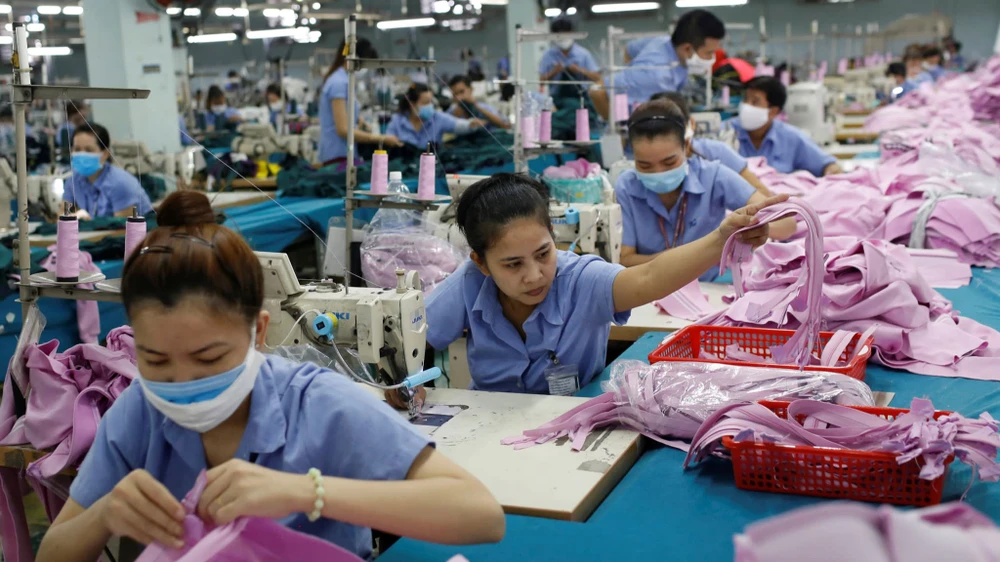
Vietnam's National Assembly approved a free trade agreement with the European Union on Monday, a move expected to help make the country a new investment destination for manufacturers looking to leave China.
The EU-Vietnam Free Trade Agreement (EVFTA) was unanimously approved and, following formal ratification, will take effect as early as August. The trade deal has already been ratified by the EU, making Vietnam the second Southeast Asian nation to have such a trade treaty with the European bloc after Singapore.
A display in the assembly hall showed that all 457 lawmakers voted in favor of the trade pact on Monday, during the voting session. Of the entire members eligible to vote, 94.62% lawmakers approved the trade pact.
"Along with the benefits, the EVFTA also poses some challenges. The EVFTA creates competitive pressures on goods and services from the EU for Vietnamese businesses, goods and services," the website also pointed out.
Once the agreement takes effect, 71% of exports from Vietnam to the EU will become duty-free, as will 65% of EU shipments to Vietnam. The remaining tariffs up to 99% will be phased out by Hanoi over 10 years and by Brussels over seven years.
With about 96 million people, Vietnam has the third-largest population among the 10-member Association of Southeast Asian Nations. Per capita GDP is estimated at nearly $3,500 for 2019, topping the $3,000 benchmark at which car and appliance ownership tends to take off.
Hanoi already benefits from the EU's preferential tariff scheme. But the trade deal is sure to make the bloc a bigger buyer of Vietnamese goods, rising from its current share of about 15%.
Particularly strong growth is expected for apparel and footwear, which account for roughly 20% of Vietnam's total exports. Vietnam ranks as the world's third-largest apparel exporter after China and Bangladesh.
Vietnamese textile companies have prepared to enter the EU market. Once the deal takes effect, the bloc is to eliminate tariffs on 77.3% of Vietnam's textile and apparel exports after five years and the remaining 22.7% after seven years.
Many companies in the local industry claim their contracts with partners in the EU and the U.S. have been canceled, delayed or scaled down recently. Vietnam's garment industry reported that all enterprises were affected by the pandemic, saying that 70% of members were urged to cut laborers in March and more will have to reduce laborers in April and May.
Hopes are growing that the trade deal will give a much-needed boost to Vietnam's economy, which is certain to suffer a slowdown from the 7% growth it enjoyed before the coronavirus pandemic. Vietnam targets garment export turnover of $34 billion this year, down from $39 billion last year.
The trade agreement is good news for multinational manufacturers outside EU as well. Among Japanese enterprises, apparel companies such as Uniqlo operator Fast Retailing source clothing in Vietnam, while makers of auto and machinery parts look to increase shipments from Vietnam to Europe.
Hanoi's exports to the EU market reached $42 billion in 2019, while the bloc's shipments to Vietnam totaled $15 billion, Vietnamese government data shows.
Hanoi has high hopes for the free trade agreement. The Ministry of Planning and Investment expects Vietnam's export revenue to the EU to rise 42.7% by 2025 and 44.37% by 2030 compared with the no-deal scenario.
The World Bank projects that the free trade agreement will help raise Vietnam's gross domestic product by 2.4% and lift exports 12% by 2030. Tran Tuan Anh, the minister of industry and trade, has said the agreement will speed the reduction of poverty in Vietnam.

"The EVFTA is now more important than ever, as trade wars and a global pandemic disrupt normal business operations on an unprecedented scale," European Chamber of Commerce in Vietnam said on Monday. "This agreement represents a true 'win-win' not just for European and Vietnamese enterprises; but also for citizens on both sides. Now, the next step is to ensure a smooth and effective implementation," EuroCham added.
Nguyen Thi Thu Trang of the Vietnam Chamber of Commerce and Industry said the deal will drive businesses to reignite their export activities after market demand declined due to the coronavirus pandemic.
The trade deal gives the EU, whose Vietnam-bound exports include aircraft and automobiles, greater access to an attractive consumer market.
Post-Brexit Britain will be part of the EU trade pact with Vietnam until the end of 2020. The U.K. ambassador to Vietnam, Gareth Ward, told British companies here in an online conference that the two countries are working on a bilateral trade deal and expect to reach an agreement by year's end.
Vietnam is also part of the free trade effort known as the Regional Comprehensive Economic Partnership, which includes all of Southeast Asia as well as Australia, China, India, Japan, New Zealand and South Korea. The country also seeks a trade deal with Israel. Local companies are urging Vietnam to negotiate a free trade agreement with the U.S. as soon as possible.




















